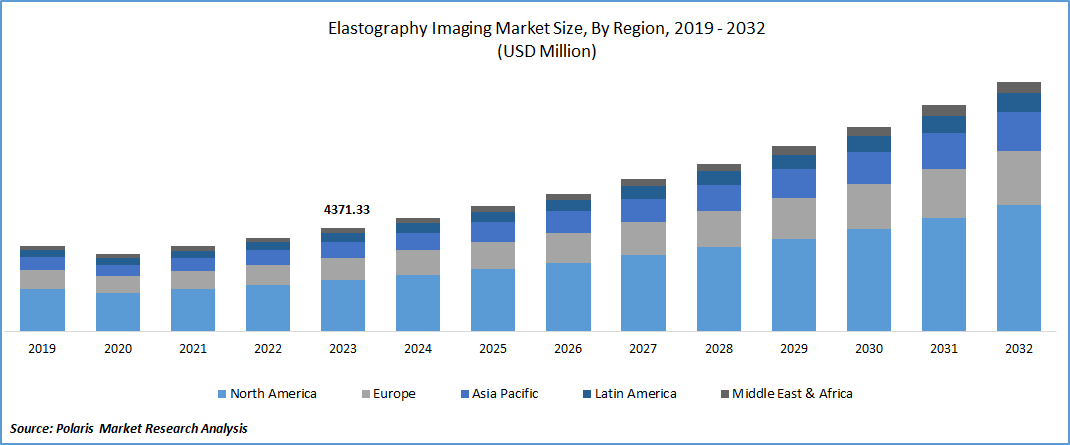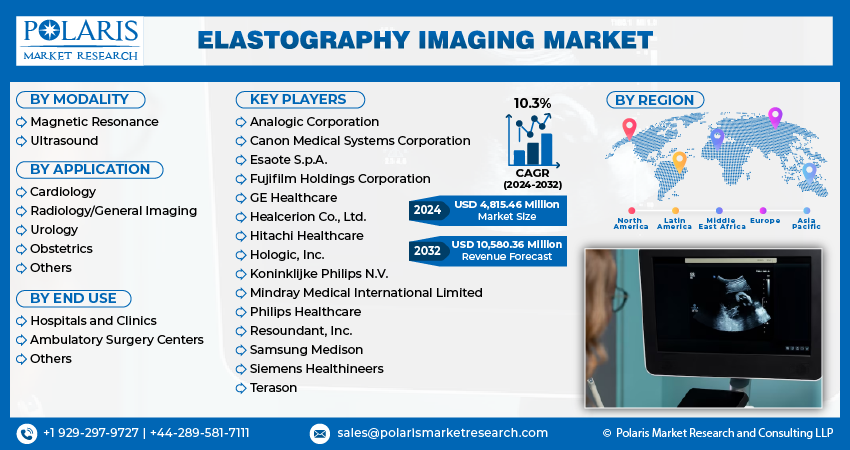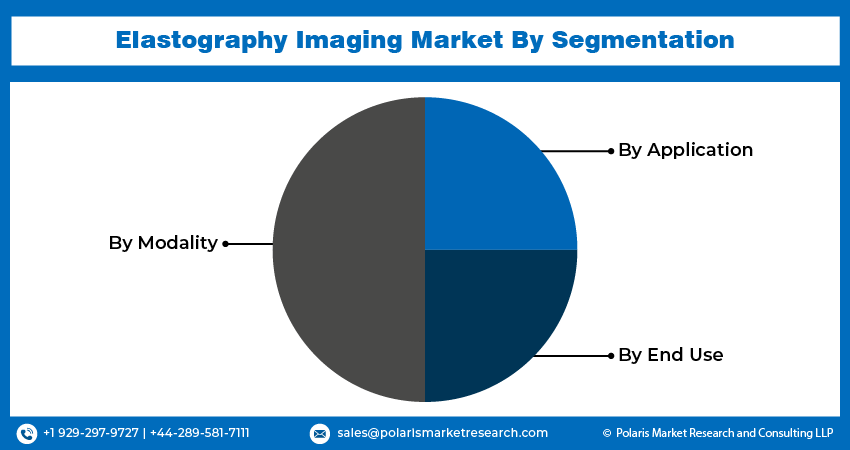
Elastography Imaging Market Size, Share, Trends, Industry Analysis Report
: By Modality (Magnetic Resonance and Ultrasound), Application, End Use, and Region (North America, Europe, Asia Pacific, Latin America, and Middle East & Africa) – Market Forecast, 2025–2034
- Published Date:Aug-2025
- Pages: 119
- Format: PDF
- Report ID: PM4623
- Base Year: 2024
- Historical Data: 2020-2023
Market Overview
The elastography imaging market size was valued at USD 2,280.93 million in 2024, exhibiting a CAGR of 7.3% during 2025–2034. The market is expanding due to the rising prevalence of chronic diseases, increasing demand for non-invasive diagnostic methods, advancements in imaging technology, and the growing need for early detection of conditions such as liver diseases and cancer, particularly breast cancer.
Key Insights
- Ultrasound elastography leads the market due to its non-invasive nature, affordability, and ability to assess liver diseases and tumors, especially in oncology.
- Radiology/general imaging dominates in application due to its widespread use in diagnosing liver fibrosis, breast lesions, and thyroid abnormalities with real-time tissue stiffness assessment.
- North America holds the largest market share, supported by robust healthcare infrastructure, advanced imaging technology adoption, and ongoing investments in research and development.
- Asia Pacific shows the fastest growth, driven by an aging population, rising chronic disease rates, improved healthcare infrastructure, and increasing medical tourism, boosting elastography adoption.
Industry Dynamics
- Increasing use of non-invasive diagnostic methods in liver disease management and oncology is driving demand for elastography imaging.
- Technological advancements, such as AI integration and real-time imaging, are enhancing diagnostic precision and market growth.
- The growing prevalence of chronic diseases and cancer, particularly liver diseases and breast cancer, is fueling elastography adoption.
- Strong investments in healthcare infrastructure and R&D, especially in North America and Asia Pacific, are driving market adoption.
- High equipment costs and limited healthcare access in some regions may slow market expansion, especially in low-resource settings.
Market Statistics
2024 Market Size: USD 2,280.93 million
2034 Projected Market Size: USD 4,603.56 million
CAGR (2025–2034): 7.3%
North America: Largest market in 2024
AI Impact on Elastography Imaging Market
- AI integration enhances the accuracy and speed of elastography imaging, improving diagnostic precision and patient outcomes.
- Machine learning algorithms analyze tissue stiffness more effectively, identifying early-stage diseases and improving disease management.
- AI enables automated interpretation of elastography images, reducing human error and ensuring consistent, reliable results.
- The combination of AI with elastography imaging accelerates the adoption of personalized medicine, tailoring treatments to individual patients' needs.
- AI-driven advancements are making elastography imaging more accessible and cost-effective, particularly in resource-limited regions.

To Understand More About this Research: Request a Free Sample Report
The elastography imaging market focuses on assessing tissue stiffness and elasticity. This technique is widely used in diagnosing liver diseases, cancer, and other conditions where tissue hardness serves as a critical indicator. By offering a non-invasive and 3D imaging solution, elastography has gained prominence in modern healthcare. The market is experiencing steady growth, driven by the increasing prevalence of chronic diseases and the rising demand for advanced diagnostic tools. Additionally, technological advancements in ultrasound devices and magnetic resonance imaging have enhanced the accuracy and efficiency of elastography techniques, further supporting the elastography imaging market expansion.
The growing need for early disease detection, particularly in oncology and hepatology, drives the market size. The adoption of elastography imaging is expected to increase as healthcare providers shift towards non-invasive diagnostic methods. The rising global burden of liver diseases, fueled by lifestyle-related disorders and viral infections, has further accelerated elastography imaging market demand. Additionally, the integration of artificial intelligence in medical imaging is improving diagnostic precision, making elastography a preferred choice among medical professionals.
Market Dynamics
Increasing Prevalence of Chronic Liver Diseases
Chronic liver diseases, including hepatitis and liver cirrhosis, have become a significant health concern worldwide. According to the Centers for Disease Control and Prevention (CDC), the death numbers for chronic liver disease and cirrhosis in 2022 reached 54,803 in the US. This upward trend underscores the urgent need for effective diagnostic tools that facilitate early detection and management of liver conditions. Elastography imaging offers a non-invasive method to assess liver stiffness, providing critical information for the diagnosis and monitoring of liver diseases. The growing incidence of liver-related ailments has consequently heightened the demand for elastography imaging systems, propelling the elastography imaging market growth.
Rising Incidence of Breast Cancer
Breast cancer remains one of the most prevalent cancers affecting women globally. The American Cancer Society reported that breast cancer is the second-leading cause of cancer-related deaths among women. For instance, the Centers for Disease Control and Prevention (CDC) reported that in 2021, approximately 272,454 cases of breast cancer were diagnosed in women in the United States. Early detection is pivotal in improving survival rates, and elastography imaging has emerged as a valuable tool in this regard. By providing detailed insights into tissue elasticity, elastography aids in distinguishing between benign and malignant breast lesions. The increasing number of breast cancer cases and breast cancer therapy has led to a greater reliance on advanced diagnostic techniques such as elastography imaging, thereby fueling the expansion of the elastography imaging market.

Segment Insights
Assessment by Modality
The elastography imaging market is segmented by modality into magnetic resonance and ultrasound. Ultrasound segment dominated the market in 2024. This modality's widespread adoption can be attributed to its non-invasive nature, cost-effectiveness, and versatility in assessing various medical conditions. Ultrasound elastography is extensively utilized for evaluating liver stiffness, aiding in the diagnosis and monitoring of liver diseases such as fibrosis and cirrhosis. Additionally, it plays a crucial role in oncology by assisting in the differentiation between benign and malignant tumors, particularly in breast cancer assessments. The real-time imaging capabilities and ease of integration into existing ultrasound systems further enhance its appeal among healthcare providers. The combination of these factors has solidified ultrasound elastography's position as the leading segment in the market.
Evaluation by Application
The elastography imaging market segmentation, based on application, includes cardiology, radiology/general imaging, urology, obstetrics, and others. Radiology/general imaging has emerged as the leading segment within the market. This prominence is attributed to the modality's extensive application in diagnosing and monitoring various conditions, including liver fibrosis, breast lesions, and thyroid abnormalities. The non-invasive nature of elastography, coupled with its ability to provide real-time assessment of tissue stiffness, enhances its utility in general imaging practices. Healthcare providers increasingly rely on elastography to complement traditional imaging techniques, thereby improving diagnostic accuracy and patient outcomes. The broad applicability and growing adoption of elastography in general imaging underscore its dominant position in the market.

Regional Insights
By region, the study provides the elastography imaging market insights into North America, Europe, Asia Pacific, Latin America, and the Middle East & Africa, each contributing uniquely to the market's dynamics. The market exhibits distinct trends across various regions, influenced by factors such as healthcare infrastructure, the prevalence of chronic diseases, technological advancements, and governmental initiatives.
North America recorded the largest elastography imaging market share in 2024. This leadership is driven by a well-established healthcare infrastructure, widespread adoption of advanced imaging technologies, and significant investments in research and development. The region benefits from the presence of numerous global market players and a proactive approach toward early disease detection and preventive healthcare. Collectively, these factors contribute to North America's dominant position in the market.
Asia Pacific is experiencing the fastest elastography imaging market growth. An increasing geriatric population, rising prevalence of chronic diseases, and improvements in healthcare services fuel this rapid expansion. Countries such as China and India are at the forefront, with significant investments in healthcare infrastructure and a growing emphasis on early disease detection. Additionally, the increasing medical tourism industry in the region is enhancing the adoption of advanced diagnostic technologies such as elastography imaging. These developments position Asia Pacific as the most rapidly growing market.

Key Players and Competitive Insights
The elastography imaging market features several prominent companies actively providing relevant products and solutions. Key players include Canon Medical Systems Corporation; Esaote SpA; Fujifilm Holdings Corporation; GE HealthCare; Hitachi, Ltd.; Hologic, Inc.; Koninklijke Philips N.V.; Shenzhen Mindray Bio-Medical Electronics Co., Ltd.; Siemens Healthineers AG; and Samsung Medison Co., Ltd. These companies are instrumental in advancing elastography imaging technologies and maintaining a competitive presence in the market.
The competitive landscape of the market is characterized by continuous technological innovation and strategic collaborations among key industry players. Companies are investing significantly in research and development to enhance the accuracy, functionality, and real-time imaging capabilities of elastography systems. Strategic partnerships and acquisitions are common, aimed at expanding market reach and integrating complementary technologies. This dynamic environment fosters the development of advanced diagnostic tools, meeting the growing demand for non-invasive imaging solutions in various medical applications.
Canon Medical Systems Corporation, headquartered in Japan, offers a comprehensive range of medical imaging solutions, including advanced elastography imaging systems. Their product portfolio features ultrasound and magnetic resonance imaging (MRI) technologies equipped with elastography capabilities, which facilitate non-invasive assessment of tissue stiffness for applications such as liver fibrosis evaluation and oncology diagnostics. Canon's commitment to innovation and quality positions it as a significant contributor to the elastography imaging market.
GE HealthCare, based in the United States, provides a wide range of medical imaging equipment and services, with elastography imaging being a key component. Their ultrasound systems incorporate elastography features that enable clinicians to assess tissue elasticity effectively, aiding in the diagnosis of conditions such as liver disease and cancer. GE HealthCare's focus on integrating advanced technologies into its imaging solutions underscores their relevance and influence in the elastography imaging market.
List of Key Companies
- Canon Medical Systems Corporation
- Esaote SpA
- Fujifilm Holdings Corporation
- GE HealthCare
- Hitachi, Ltd.
- Hologic, Inc.
- Koninklijke Philips N.V.
- Samsung Medison Co., Ltd.
- Shenzhen Mindray Bio-Medical Electronics Co., Ltd.
- Siemens Healthineers AG
Elastography Imaging Industry Developments
- June 2023: Nikon Instruments Inc. announced the development and launch of the "ECLIPSE Ui," an advanced microscope-based viewing system designed for seamless clinical observations. It supports both in-person and remote pathological assessments.
- July 2023: At the Microscopy and Microanalysis (M&M) 2023 Conference, ZEISS Microscopy unveiled its latest product and showcased emerging researchers through interactive display features.
Elastography Imaging Market Segmentation
By Modality Outlook (Revenue-USD Million, 2020–2034)
- Magnetic Resonance
- Ultrasound
By Application Outlook (Revenue-USD Million, 2020–2034)
- Cardiology
- Radiology/General Imaging
- Urology
- Obstetrics
- Others
By End Use Outlook (Revenue-USD Million, 2020–2034)
- Hospitals & Clinics
- Ambulatory Surgery Centers
- Others
By Regional Outlook (Revenue-USD Million, 2020–2034)
- North America
- US
- Canada
- Europe
- Germany
- France
- UK
- Italy
- Spain
- Netherlands
- Russia
- Rest f Europe
- Asia Pacific
- China
- Japan
- India
- Malaysia
- Suth Korea
- Indnesia
- Australia
- Vietnam
- Rest f Asia Pacific
- Middle East & Africa
- Saudi Arabia
- UAE
- Israel
- Suth Africa
- Rest f Middle East & Africa
- Latin America
- Mexic
- Brazil
- Argentina
- Rest f Latin America
Elastography Imaging Market Report Scope
|
Report Attributes |
Details |
|
Market Size Value in 2024 |
USD 2,280.93 million |
|
Market Size Value in 2025 |
USD 2,441.74 million |
|
Revenue Forecast by 2034 |
USD 4,603.56 million |
|
CAGR |
7.3% from 2025 to 2034 |
|
Base Year |
2024 |
|
Historical Data |
2020–2023 |
|
Forecast Period |
2025–2034 |
|
Quantitative Units |
Revenue in USD million and CAGR from 2025 to 2034 |
|
Report Coverage |
Revenue Forecast, Market Competitive Landscape, Growth Factors, and Industry Insights |
|
Segments Covered |
|
|
Regional Scope |
|
|
Competitive Landscape |
|
|
Report Format |
|
|
Customization |
Report customization as per your requirements with respect to countries, regions, and segmentation. |
How is Report Valuable for Organization?
Workflow/Innovation Strategy: The elastography imaging market has been segmented into detailed segments of modality, application, and end use. Moreover, the study provides the reader with a detailed understanding of the different segments at both the global and regional levels.
Growth/Marketing Strategy: The elastography imaging market is expanding through a combination of technological advancements, strategic partnerships, and increasing adoption in clinical diagnostics. Companies are focusing on integrating artificial intelligence and machine learning to enhance imaging accuracy and efficiency. Additionally, collaborations with healthcare institutions and research centers are driving innovation and expanding market reach. Market players are also investing in geographical expansion, particularly in emerging economies, to tap into the growing demand for advanced diagnostic tools. Furthermore, regulatory approvals and product launches continue to strengthen market presence and competitiveness.
FAQ's
The elastography imaging market size was valued at USD 2,280.93 million in 2024 and is projected to grow to USD 4,603.56 million by 2034.
The market is projected to register a CAGR of 7.3% during the forecast period, 2025-2034.
North America had the largest share of the market.
Key players in the elastography imaging market include Canon Medical Systems Corporation (Canon Inc.); Esaote SpA; Fujifilm Holdings Corporation; GE HealthCare (General Electric Company); Hitachi, Ltd.; Hologic, Inc.; Koninklijke Philips N.V.; Shenzhen Mindray Bio-Medical Electronics Co., Ltd.; Siemens Healthineers AG (Siemens AG); and Samsung Medison Co., Ltd. (Samsung Electronics Co., Ltd.).
The radiology/general imaging segment accounted for the larger market share in 2024.
Elastography imaging is a medical imaging technique used to assess the stiffness or elasticity of tissues in the body.
